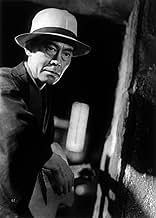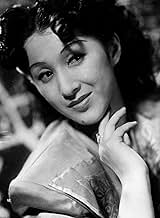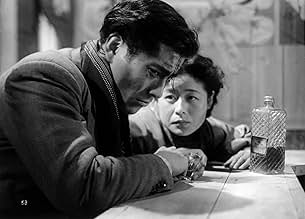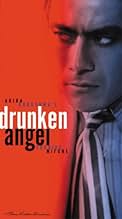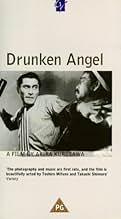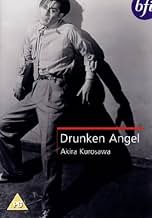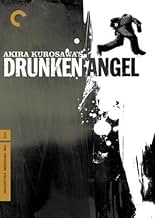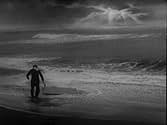IMDb रेटिंग
7.6/10
14 हज़ार
आपकी रेटिंग
अपनी भाषा में प्लॉट जोड़ेंA drunken doctor with a hot temper and a violence-prone gangster with tuberculosis form a quicksilver bond.A drunken doctor with a hot temper and a violence-prone gangster with tuberculosis form a quicksilver bond.A drunken doctor with a hot temper and a violence-prone gangster with tuberculosis form a quicksilver bond.
- निर्देशक
- लेखक
- स्टार
- पुरस्कार
- कुल 4 जीत
Mayuri Mokushô
- Daughter at Flower Shop
- (as Kumiko Mokushô)
फ़ीचर्ड समीक्षाएं
This movie was a big surprise for me. I watched this movie yesterday expecting it to be one of Akira Kurosawa's weaker films, but it ended up being my second-favourite Kurosawa film after Seven Samurai. All the other Kurosawa films I've seen were set in feudal Japan, so it was quite refreshing to see one set in post-war Japan for a change. While Kurosawa's other movies had a major impact on the samurai genre, Drunken Angel was arguably the earliest example of a Yakuza film.
Unlike the other Kurosawa movies I've seen, I found Drunken Angel gripping from the moment it began. Despite the film being shorter than the other Kurosawa films I've seen as well, the character development was very impressive and the ending was powerful. Being Toshiro Mifune's first major role, he obviously looks younger and hasn't yet developed his unique acting mannerisms. That's a good thing though, as it makes him seem like a completely different person in this movie. His portrayal of the Yakuza thug Matsunaga was impressive and very moving. The star of the movie though is Takashi Shimura (another veteran actor of Kurosawa movies), who plays the forward-thinking Dr. Sanada. His sarcastic dialogues in particular were excellent, without feeling clichéd at all.
I think it's a real shame this movie isn't so famous like Kurosawa's other movies, but I found this film incredibly moving and it is now my second-favourite Kurosawa film of all time after Seven Samurai.
9/10
Unlike the other Kurosawa movies I've seen, I found Drunken Angel gripping from the moment it began. Despite the film being shorter than the other Kurosawa films I've seen as well, the character development was very impressive and the ending was powerful. Being Toshiro Mifune's first major role, he obviously looks younger and hasn't yet developed his unique acting mannerisms. That's a good thing though, as it makes him seem like a completely different person in this movie. His portrayal of the Yakuza thug Matsunaga was impressive and very moving. The star of the movie though is Takashi Shimura (another veteran actor of Kurosawa movies), who plays the forward-thinking Dr. Sanada. His sarcastic dialogues in particular were excellent, without feeling clichéd at all.
I think it's a real shame this movie isn't so famous like Kurosawa's other movies, but I found this film incredibly moving and it is now my second-favourite Kurosawa film of all time after Seven Samurai.
9/10
Kurosawa began his career as a jobbing director, making the pictures the studio wanted him to in conventional, by-the-book style. It was with Drunken Angel, his eighth film, that he turned a corner. He regarded it as the first film that was really his, and typically here combining bold social commentary with tender sympathy towards flawed and downtrodden characters.
This also marks the beginning of one of the greatest actor-director relationships in the history of cinema, with the young Toshiro Mifune making his debut for Kurosawa. It is amazing how naturally talented an actor Mifune was. He already knew exactly how to move in front of the camera, and could convey so much with the tiniest of gestures. However, he doesn't get to show off his full range here. Also, in the leading role, is Kurosawa regular and fantastic character actor Takashi Shimura. There isn't really one bad performance in the whole thing.
Drunken Angel is essentially a lament for the state of post-war Japanese society. Not only does the story concern the victims of that era, it is also an extended allegory using illness and contamination as a metaphor for the state of the nation. The central characters a tubercular gangster (Mifune) and an alcoholic doctor (Shimura) are partly to blame for their own conditions, and while they want to get better haven't the willpower to do so. The pond of stagnant water outside the doctor's surgery, a constantly recurring image of despair, seems to be the result of a bomb crater from the war.
The plot structure is episodic and bitty, somewhat reminiscent of neo-realist cinema. Unfortunately this makes the whole thing a bit lacking in pace and even boring in places. Things really start to pick up in the second half of the film when the plot starts to come together. The introduction of Okada, a gangland boss who has just finished a stint in prison, adds an element of danger to what has so far only been a gloomy drama.
Music is a constant presence in Drunken Angel, with diagetic music (i.e. really there in the scene rather than a background score) being used to give atmosphere and introduce characters. A whole variety of tunes are heard blasting from bars and dance halls, but most memorable of all is a man who sits outside the surgery playing a dismal Japanese folk melody on an acoustic guitar. This acts like a theme tune for the doctor. However, when Okada appears he takes the guitar and announces his presence by playing a doom-laden classical piece. This seems to have been a major influence on Sergio Leone, particularly on the character of Harmonica in his Once Upon a Time in the West (1968).
It is in the final act of this picture that Kurosawa reveals his talent for deeply sentimental and emotional direction. I won't reveal exactly what happens, but as the film looks set to reach a tense finale (in what is the only proper action sequence) Kurosawa turns it on its head, using expert timing, camera-work, cross-cutting and Fumio Hayasaka's score to produce a scene of incredible poignancy. Another Kurosawa trademark which is established here was his way of injecting a little note of hope into the ending of his darker pessimistic pictures, with the final scene suggesting there may be a cure for this sick society.
Despite all these developments in Kurosawa's style, he was not quite yet ready to turn out a masterpiece. In some ways he seems to have simply crammed every idea he had at the time into the 95 minutes. There is even a dream sequence in which Mifune smashes open a coffin is chased by a zombie version of himself. This hints towards Kurosawa's later horror-tinged work and a similar but better done scene in Kagemusha (1980), but here it seems a little clichéd and very much at odds with the overall tone of the film. Drunken Angel has its moments and is packed with good elements, which is why I rate it as highly as I do, but as a whole it doesn't come together enough to really suck the viewer in.
This also marks the beginning of one of the greatest actor-director relationships in the history of cinema, with the young Toshiro Mifune making his debut for Kurosawa. It is amazing how naturally talented an actor Mifune was. He already knew exactly how to move in front of the camera, and could convey so much with the tiniest of gestures. However, he doesn't get to show off his full range here. Also, in the leading role, is Kurosawa regular and fantastic character actor Takashi Shimura. There isn't really one bad performance in the whole thing.
Drunken Angel is essentially a lament for the state of post-war Japanese society. Not only does the story concern the victims of that era, it is also an extended allegory using illness and contamination as a metaphor for the state of the nation. The central characters a tubercular gangster (Mifune) and an alcoholic doctor (Shimura) are partly to blame for their own conditions, and while they want to get better haven't the willpower to do so. The pond of stagnant water outside the doctor's surgery, a constantly recurring image of despair, seems to be the result of a bomb crater from the war.
The plot structure is episodic and bitty, somewhat reminiscent of neo-realist cinema. Unfortunately this makes the whole thing a bit lacking in pace and even boring in places. Things really start to pick up in the second half of the film when the plot starts to come together. The introduction of Okada, a gangland boss who has just finished a stint in prison, adds an element of danger to what has so far only been a gloomy drama.
Music is a constant presence in Drunken Angel, with diagetic music (i.e. really there in the scene rather than a background score) being used to give atmosphere and introduce characters. A whole variety of tunes are heard blasting from bars and dance halls, but most memorable of all is a man who sits outside the surgery playing a dismal Japanese folk melody on an acoustic guitar. This acts like a theme tune for the doctor. However, when Okada appears he takes the guitar and announces his presence by playing a doom-laden classical piece. This seems to have been a major influence on Sergio Leone, particularly on the character of Harmonica in his Once Upon a Time in the West (1968).
It is in the final act of this picture that Kurosawa reveals his talent for deeply sentimental and emotional direction. I won't reveal exactly what happens, but as the film looks set to reach a tense finale (in what is the only proper action sequence) Kurosawa turns it on its head, using expert timing, camera-work, cross-cutting and Fumio Hayasaka's score to produce a scene of incredible poignancy. Another Kurosawa trademark which is established here was his way of injecting a little note of hope into the ending of his darker pessimistic pictures, with the final scene suggesting there may be a cure for this sick society.
Despite all these developments in Kurosawa's style, he was not quite yet ready to turn out a masterpiece. In some ways he seems to have simply crammed every idea he had at the time into the 95 minutes. There is even a dream sequence in which Mifune smashes open a coffin is chased by a zombie version of himself. This hints towards Kurosawa's later horror-tinged work and a similar but better done scene in Kagemusha (1980), but here it seems a little clichéd and very much at odds with the overall tone of the film. Drunken Angel has its moments and is packed with good elements, which is why I rate it as highly as I do, but as a whole it doesn't come together enough to really suck the viewer in.
A very, very vivid film from Japanese legend, Akira Kurosawa. The Japanese town that is the setting for "Drunken Angel" is vividly captured by Kurosawa, and the filthy swamp that separates the doctor from the filthiness of the town is brilliant. Toshiro Mifune plays a tuberculosis stricken gangster who is slowly won over, despite his vicious pride, by the caring but sarcastic doctor. The swamp is a reflection of the corruption in the town and in one of the first scenes a group of children are seen playing in it. Kurosawa's way of foreshadowing these children's future since the town is controlled by the immoral gangsters. With the arrival of Okadu, a released convict and gangster, and struggles with his health, Mifune struggles through conflicts of soul which are brilliantly metaphored by Kurosawa. A great drama with some brilliant commentary about post-WW2 Japan. Solid characters carry with film about typical with the Doctor being an unforgettable creation and Toshiro Mifune giving a powerful performance.
DRUNKEN ANGEL sees the master of Japanese cinema, Akira Kurosawa, on solid form in the simplistic tale of the developing friendship between an alcoholic doctor and a dying gangster who comes to him for help. While the story is set very noticeably in a poor, run-down, post-WW2 Japan, the story is one which brims with life and vitality, which is somewhat ironic given the subject matter.
The calibre of the acting is second to none which is no surprise for fans of the director. Takashi Shimura underpins the whole thing as the titular character, a stressed-out doctor battling the bottle as well as the problems of his various associates and patients, but it's Toshiro Mifune who gives the stand-out turn here. This was the star's first collaboration with Kurosawa and it comes as no surprise that the pair would go on to re-team many times in the future. Mifune's performance as the small-fry gangster, addicted to drinking and partying and yet suffering from the effects of tuberculosis, is one of his greats.
Kurosawa's cinematography is another winner here, and there are some fine moments of tension including a great, extended fight scene at the climax. My favourite moment is a bizarre dream sequence in which Mifune is chased along a beach by a corpse only to find himself trapped in a slow motion run. It's one of the few times that the director went for outright horror (along with THRONE OF BLOOD) and it makes me wish he had made an all-out horror film at least once in his career.
The calibre of the acting is second to none which is no surprise for fans of the director. Takashi Shimura underpins the whole thing as the titular character, a stressed-out doctor battling the bottle as well as the problems of his various associates and patients, but it's Toshiro Mifune who gives the stand-out turn here. This was the star's first collaboration with Kurosawa and it comes as no surprise that the pair would go on to re-team many times in the future. Mifune's performance as the small-fry gangster, addicted to drinking and partying and yet suffering from the effects of tuberculosis, is one of his greats.
Kurosawa's cinematography is another winner here, and there are some fine moments of tension including a great, extended fight scene at the climax. My favourite moment is a bizarre dream sequence in which Mifune is chased along a beach by a corpse only to find himself trapped in a slow motion run. It's one of the few times that the director went for outright horror (along with THRONE OF BLOOD) and it makes me wish he had made an all-out horror film at least once in his career.
I loved this movie for many reasons:
The film history : it's the first collaboration between Akira Kurosawa (director) and Toshiro Mifune (actor) that continued through 15 more films including the sublime Rashomon, Seven Samurai and Yojimbo.
The style : it's a great film noir with gangsters, zoot suits, speakeasy's, gambling etc.,
The history : post WW II Japan is a frightening place with rubble, raw sewage, crime and hope. It's a world I hadn't seen before.
Toshiro Mifune : What an amazing actor. He oozes charisma and you cannot take your eyes off of him. His performance reminded me of the first time I saw Russell Crowe, in a little seen mediocre movie called "For the Moment" which I watched many times because of Crowe's intensity.
My only problem is the copy I saw was terrible. The print was faded and half of the subtitles were illegible. When will this be released on DVD? It's not Kurosawa's best film, but it's certainly better than most of the drivel out there.
The film history : it's the first collaboration between Akira Kurosawa (director) and Toshiro Mifune (actor) that continued through 15 more films including the sublime Rashomon, Seven Samurai and Yojimbo.
The style : it's a great film noir with gangsters, zoot suits, speakeasy's, gambling etc.,
The history : post WW II Japan is a frightening place with rubble, raw sewage, crime and hope. It's a world I hadn't seen before.
Toshiro Mifune : What an amazing actor. He oozes charisma and you cannot take your eyes off of him. His performance reminded me of the first time I saw Russell Crowe, in a little seen mediocre movie called "For the Moment" which I watched many times because of Crowe's intensity.
My only problem is the copy I saw was terrible. The print was faded and half of the subtitles were illegible. When will this be released on DVD? It's not Kurosawa's best film, but it's certainly better than most of the drivel out there.
क्या आपको पता है
- ट्रिवियाIn early drafts of the script, the story was almost entirely about Doctor Sanada (Takashi Shimura) and Matsunaga the thug (Toshirô Mifune) was a small supporting part. However, Akira Kurosawa was so impressed with Mifune's performance that he greatly increased the Matsunaga part, to the point where the Doctor and Matsunaga are almost equal in screen-time.
- गूफ़Even though the story takes place during the hot summer, breath can be seen coming from characters in several scenes.
- भाव
Dr. Sanada: The Japanese love to sacrifice themselves for stupid things.
- कनेक्शनFeatured in Kurosawa and the Censors (2007)
टॉप पसंद
रेटिंग देने के लिए साइन-इन करें और वैयक्तिकृत सुझावों के लिए वॉचलिस्ट करें
- How long is Drunken Angel?Alexa द्वारा संचालित
विवरण
- रिलीज़ की तारीख़
- कंट्री ऑफ़ ओरिजिन
- भाषा
- इस रूप में भी जाना जाता है
- Drunken Angel
- फ़िल्माने की जगहें
- Toho Studios, टोक्यो, जापान(Studio)
- उत्पादन कंपनी
- IMDbPro पर और कंपनी क्रेडिट देखें
बॉक्स ऑफ़िस
- US और कनाडा में सकल
- $46,808
- US और कनाडा में पहले सप्ताह में कुल कमाई
- $15,942
- 28 जुल॰ 2002
- दुनिया भर में सकल
- $47,023
- चलने की अवधि
- 1 घं 38 मि(98 min)
- रंग
- पक्ष अनुपात
- 1.37 : 1
इस पेज में योगदान दें
किसी बदलाव का सुझाव दें या अनुपलब्ध कॉन्टेंट जोड़ें

